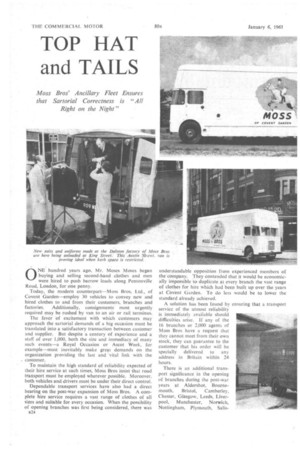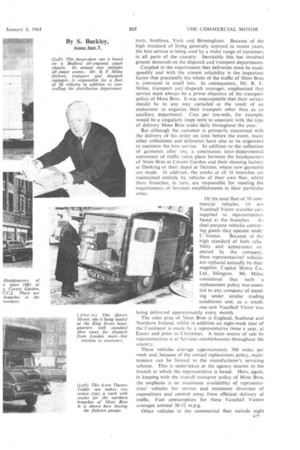TOP HAT and TAILS
Page 58

Page 59

Page 60

If you've noticed an error in this article please click here to report it so we can fix it.
Moss Bros' Ancillary Fleet Ensures that Sartorial Correctness is "All Right on the Night" By S. Buckley, Assoc.Inst.T.
ONE hundred years ago, Mr. Moses Moses began buying and selling second-hand clothes and men were hired to push barrow loads along Pentonville Road, London, for one penny.
Today, the modern counterpart—Moss Bros. Ltd., of Covent Garden—employ 30 vehicles to convey new and hired clothes to and from their customers, branches and factories. Additionally, consignments most urgently required may be rushed by van to an air or rail terminus.
The fever of excitement with which customers may approach the sartorial demands of a big occasion must be translated into a satisfactory transaction between customer and supplier. But despite a century of experience and a staff of over 1,000, both the size and immediacy of many such events—a Royal Occasion or Ascot Week, for example—must inevitably make great demands on the organization providing the last and vital link with the Customer.
To maintain the high standard of reliability expected of their hire service at such times, Moss Bros insist that road transport must be employed wherever possible. Moreover, both vehicles and drivers must be under their direct control.
Dependable transport services have also had a direct bearing on the post-war expansion of Moss Bros. A complete hire service requires a vast range of clothes of all sizes and suitable for every occasion. When the possibility of opening branches was first being considered, there was B24 understandable opposition from experienced members of the company. They contended that it would be economically impossible to duplicate at every branch the vast range of clothes for hire which had been built up over the years at Covent Garden. To do less would be to lower the standard already achieved.
A solution has been found by ensuring that a transport service of the utmost reliability is immediately available should difficulties arise. If any of the 16 branches or 2,000 agents of Moss Bros have a request that they cannot meet from their own stock, they can guarantee to the customer that his order will be specially delivered to any address in Britain within 24 hours.
There is an additional transport significance in the opening of branches during the post-war years at Aldershot, Bournemouth, Bristol, Camberley, Chester, Glasgow, Leeds, Liverpool, • Manchester, Norwich, Nottingham, Plymouth, Salis bury, Southsea, York and Birmingham. Because of the high standard of living generally enjoyed in recent years, the hire service is being used by a wider range of customers in all parts of the country. Inevitably this has involved greater demands on the dispatch and transport departments.
Coupled to the requirement that deliveries must be made speedily and with the utmost reliability is the important factor that practically the whole of the traffic of Moss Bros is conveyed in small lots. In consequence, Mr. R. F. Milne, transport and dispatch manager, emphasized that service must always be a prime objective of the transport policy of Moss Bros. It was unacceptable that their service should be in any way curtailed as the result of an endeavour to organize their transport other than as an ancillary department. Cost per ton-mile, for example, would be a singularly inept term to associate with the type of delivery Moss Bros make daily throughout the year.
But although the customer is primarily concerned with the delivery of his order on time before the event, many other collections and deliveries have also to be organized to maintain the hire service. In addition to the collection of garments after use, a continuous inter-departmental movement of traffic takes place between the headquarters of Moss Bros at Covent Garden and their cleaning factory at Dorking or their depot at Dalston, where new garments are made. In addition, the stocks at all 16 branches are maintained entirely by vehicles of their own fleet, whilst these branches, in turn, are responsible for meeting the requirements of Services establishments in their particular areas.
Of the total fleet of 30 com mercial . Vehicles, 14 are Vauxhall Vietor traveller cars supplied to •representatives baSed at the branches. As dual-purpose vehicles conveying goods they operate under Clicence. Because of the high standard of both reliability and .appearance expected by . the company. these representatives' vehicles are replaced annually by their supplier, Capital Motor Co., Ltd., .Islington. Mr. Milne considered. that such a replacement policy was essential to any company of standing under similar trading conditions and, as a result, one new Vauxhall Victor was being delivered approximately every month.
The sales area of Moss Bros is England, Scotland and Northern Ireland, whilst in addition an eight-week tour of the Continent is made by a representative twice a year, at Easter and prior to Christmas. A main source of sale by representatives is at Services establishments throughout the country.
These vehicles average approximately 500 miles per week and, because of the annual replacement policy, maintenance can be limited to the manufacturer's servicing scheme. This is undertaken at the agency nearest to the branch at which the representative is based. Here, again, in keeping with the overall transport policy of Moss Bros, the emphasis is on maximum availability of representatives' vehicles for service and minimum diversion of expenditure and control away from efficient delivery of traffic. Fuel consumption for these Vauxhall Victors averages around 30-32 m.p.g.
Other vehicles in the commercial fleet include eight n/5 Morris, four Austins, two Fords and two Bedfords. The eight Morris are J-type 10-cwt. petrol-engined vans, and are employed on daily delivery to customers and agents within a radius of 20 miles of London, bounded by Chislehurst, Kingston, Watford and Upminster.
One of the Austins is a 2-ton van which has already covered 400,000 miles. It regularly makes two return trips per week serving all the southern branches. Leaving headquarters on Monday mornings, it travels via Camberley, Aldershot, Southsea, Bournemouth and Salisbury to Bristol. It is fitted with a Luton-bodied van built by Dennis Brothers, St. Mark's Road, London, W.10, and a petrol consumption rate of 15.5 m.p.g. is averaged.
A larger vehicle is employed on the complementary northern run. This is a 4-ton Thames Trader, oil-engined, also fitted with a Dennis Luton-type van. Moss Bros are particularly insistent that their vehicles should always present a smart appearance. In addition to the overall finish in dark blue, Mr. G. C. Francis, heraldic artist, responsible for the Coronation and Lord Mayor's Coaches, is employed to paint the motif, consisting of a dandy against a background of old Covent Garden.
The northern run is routed via Birmingham, Chester, Liverpool, Manchester and Nottingham. At Manchester part of the load is transhipped on to a 30-cwt. Austin, which is then delivered to Leeds and York. This return trip is also completed twice a week in the course of which over 60,000 miles have been achieved on two of the Dunloi tyres fitted to this vehicle.
Indicative of the standard of reliability expkted from their delivery service, Mr. Milne told me of an incident which occurred on this run when the driver concernec dismantled a faulty radiator and proceeded to the neares town for attention. The repairs were ultimately complete( and the deliveries made on time.
After the return of hired garments to headquarters, the) are then conveyed by a shuttle service operating twic4 daily to the cleaning factory at Dorking. A 2-ton Austin fitted with oil engine, is employed on this work, rnovim approximately 1,500 garments per day. Another Austir similarly operates between Covent Garden and Dalston London, N., where new clothes are made. Because of the shorter journey, this vehicle does three trips per day an( averages around 500 miles per week.
In connection with the large riding department main tamed by Moss Bros, a. special horse-show van wa: purchased two years ago at a cost of £2,800. It is base( on a Bedford coach chassis fitted with oil engine. Th4 van body is attractively finished all white with a centr4 plaque depicting a rider in red mounted on a white horsi against a background of blue cloud. The plaque is painte( on duralumin and cost £137.
This van is employed exclusively attending all mato] horse-shows throughout the country and concludes it annual tour at the Horse of the Year Show at Wembley A third of the interior of the van, at the front, is fuel ou with hanging rails to permit riding habits to be carrie( without creasing. Two doors are provided to close off thi section, and so make it dust-proof. In addition to al manner of saddlery and other horse equipment, the remain ing section houses the Calor-gas equipment and tent whict are used by the driver, and any sales staff, when stayim overnight on a show site.
Free Delivery Service
In addition to the free delivery service offered to theit customers within the van area, several vehicles of the flee; are daily employed each evening at about 8 o'clocl conveying urgent orders direct to the appropriate Londor main-line station. A typical evening's delivery may includt 200 suits on hire. In addition, a large proportion of new clothes are also conveyed, the sale of which represent! more than half the total revenue of Moss Bros.
All maintenance of vans is carried out overnight by th4 local agent. Additionally, drivers are allowed one Saturday morning per month to undertake any job they considei necessary. In keeping with their insistence on a smar appearance, a full-time cleaner is employed continually washing vehicles, either immediately following completior of the day's duties around 5.30 p.m. to 8.30 p.m., or early the following morning from 6.30 to 10.
Vans are replaced every eight years, when approximately 200,000 miles will have been clocked. In view of the naturi of the traffic, special security arrangements include th4 fitting of Chubb locks and master switches to all vehicles




















































































































